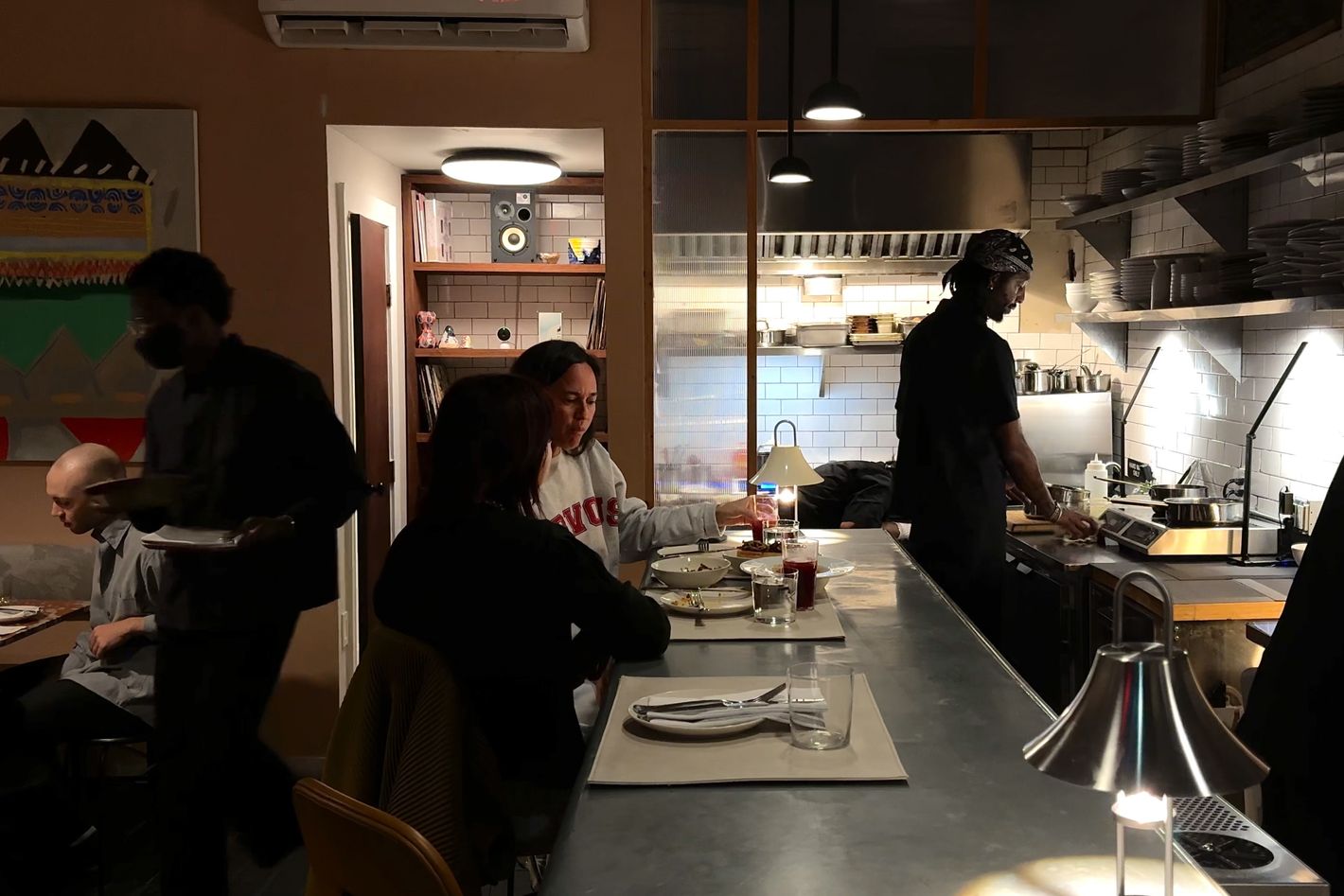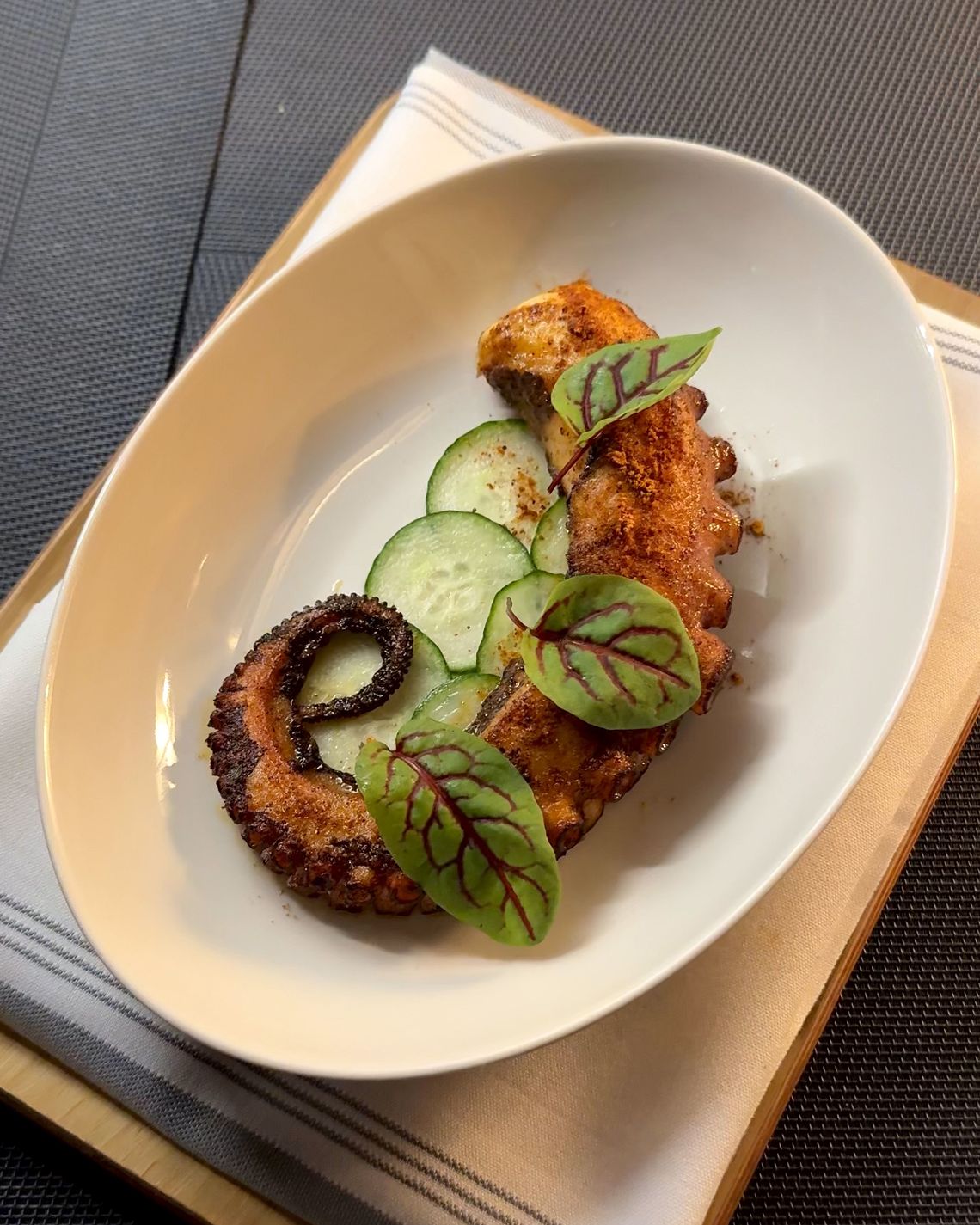when you want, where you want.
CJ Television
Radio Kwara Is a Mission Statement Masquerading as a Tavern
 Photo: Hugo Yu
Photo: Hugo Yu
So much of what’s considered American cooking has been influenced by Africa that the debt is omnipresent and often unacknowledged. As the Nigerian American chef Kwame Onwuachi of the still-nigh-unbookable Tatiana has written, Nigeria’s suya spice blend, prickly with chiles and onion, is “the grandfather of American barbecue.” Yet when many people try to conjure an image of American food, they may picture something like Rochester’s infamous garbage plates: the squidgy pile of meat, hash browns, and macaroni salad that was until recently a specialty of the house at Brooklyn Hots in Clinton Hill. That shop closed in 2022 and was replaced by the Nigerian American Radio Kwara, where dinner might include fiery pepper soup and thick slices of sweet, plush agege bread. No disrespect — my own father is from Rochester — but I know which I’d rather eat.
Ayo Balogun’s earlier restaurant, Dept of Culture, was more explicitly evangelist, offering a tasting-menu format with a shared table and Balogun personally walking diners step-by-step through courses of asaro or efo egusi. At Radio Kwara (the restaurant is named for the official broadcasting arm of Kwara State in western Nigeria; Balogun’s grandfather was its general manager), the tables are cozily spaced but distinct and the à la carte menu is yours to choose from. It styles itself as Dept of Culture’s “American cousin,” and the tiny staff does its part to ease in the unfamiliar. Agege bread is “like Texas toast,” a server told me, but that hardly does justice to the burnished slab, three knuckles high, that comes toasted in butter and topped, optionally, with a spicy, savory tangle of braised beef (good) or mushrooms (somehow even better). The ingredients of the suya, which spackles either tilapia or a single, biceps-size tentacle of octopus, are a guarded secret, but the smoke and heat are recognizably barbecue adjacent, if not the gingery sweetness that makes it interesting.
Pepper soups take a different form here than at Dept of Culture and are available in two versions: a grassier, more florally vegetal fish pepper soup, tilapia under a blanket of herbs in a deliciously murky khaki broth with a persistent, salty heat, more mustardy than incinerating; and a gamier goat-pepper version with thin shingles of meat and a skein of ramenlike noodles. Balogun’s jollof rice, meanwhile, is ink black and quite good, though the dish I kept returning to was a glutinous paste of pounded yam, sticky and stretchy, in a bath of egusi, the stewy sauce made of melon seeds and fermented locust beans that is yanked into saline savoriness by crawfish.
 Photo: Hugo Yu
Photo: Hugo Yu
Service is friendly and capable, and a turntable in the back spins Ethiopian jazz and Nigeria 70: The Definitive Story of 1970s Funky Lagos. Your meal may proceed slowly, though never, as I neared three hours at one of six tables, was I encouraged to move along. This alone is enough to distinguish Radio Kwara from thirstier, more critic-courting hot spots, but that hardly explains its absence from best-of lists and larger public awareness, and it opened more than a year ago. (Anonymous internet-message-board allegations concerning Balogun’s treatment of neighbors and some former workers, which he denies, may not be helping, either.)
Some menu items seem rarely available; the homemade cheese called warra wasn’t on either of my recent visits, probably owing to the raw milk needed to make it. There’s apparently a single dessert — I never heard about it during my meals — and no drink stronger than zobo, a sorrel tea, but for $20 in corkage, you can bring your own.
I go to the critic bait, and even so, I keep coming back to Radio Kwara, which has chugged along with admirable consistency, the kind of neighborhood spot worth calling out even as another hundred restaurants cut their ribbons each day. Despite the tiny size — Balogun calls it a buka, a Nigerian term for a hole-in-the-wall, which undersells its manicured coziness a bit — it’s never too hard to get into. It’s not cheap, but the crowd looks more like an actual cross-section of New York than the ones at many restaurants nearby. Two cooks somehow make everything happen on three induction hot plates. Yes, it has its shortcomings. The menu is not long, and there are dishes I might not order again. But the light is warm and the soup is hot.
Radio Kwara
Good Neighbors
If you don’t have your own bottle to bring, the staff at Radicle Wine next door is by this point well versed in pairing with Nigerian food.
Do Not Skip That Bread
Even the undressed version of the agege bread, served simply with obe ata, a Nigerian red-pepper spread, is delicious. Everyone should order some.
A Snacky Appetizer
Diners can start their meals with a serving of boiled groundnuts. You most likely know them by another name: peanuts.
This post has been updated.
More Reviews
All Rights Reserved. Copyright , Central Coast Communications, Inc.